- Home
- Adam Thorpe
Nine Lessons From the Dark Page 2
Nine Lessons From the Dark Read online
Page 2
7
The Danes! You can’t have forgotten them:
lona evacuated, the Golden Age of Ireland over.
The sea which had brought St Patrick
now brought the Norse gunning for God knows what:
fame, plunder, women! A fight! Their hair
is their boat’s wake: very fair and long,
like white caps, like the sea’s storminess falling
back off cliffs and freeing us tonight from fear.
8
Scribe-scratch, over and over
by the dim dip-candle in the howled-at cell.
Spring came famously on the edge of that ninth-century
‘Cassiodorus on the Psalms’ – this pleasant glint of sun,
its flicker on the vellum of the margins.
Patience breeds the patience of His will.
Nib-peck, hen-scratch: the sun flickers on my desk’s
beechwood, wealed by so many vanished boys.
9
Columba, or Cuthbert. Various rock-fingers
rising from the wastes of the sea’s ignorance.
It’s thanks to these, we were told:
on Skellig Michael’s, seven hundred feet
over the Atlantic, the monks rose
in prayer on the washed rock . . . and thus
civilisation endured through spray, sheer cold;
let otters dry its toes, without hauteur.
THE BLITZ IN EALING
You crouched under the table as the ceiling
rained down flour and the lights went out. Upstairs
whole chunks played the devil with the bed
still warm from your dreams
and the clues of hands and haunch and head.
But you weren’t there, crushed
beneath the latticework of laths,
though the air’s arch concussed you into dark
to bring you round to such amazing quiet
you were sure you were in Heaven, a graceful park
coasting to a cry, which was yours, and then
the familiar kitchen was crawling out of dust
into time you weren’t, after all, denied . . .
the All Clear siren and the shrills of bells
and the neighbours unhooked from the brick slide
that was next door’s up to minutes ago
groaning on the sofa, bleeding in the hall –
and you knew now where you were, you said
(standing in the street by your own front door),
the fiery light dancing on the stockinged dead.
LIMBO
My father worked in them for thirty years,
hassled by fog days, a prisoner of wings
and hijacks, fake bomb-calls, his singing in the ears
from standing in the shrieking reach of jets; and thinks
flying has lost its élan, these days –
more like catching a bus, he says.
And somehow something has to give, you feel,
the throng thickening in this town’s unlived-in sprawl –
families gathering between landscapes (real
places with rooms and trees), waiting for their call
at quiet anchor where the runway’s roars
sound ominous, like the booms of shores
beyond phosphorous breakers. The end, I suppose,
seems more plausible when you’re cutting loose;
I think of hospitals, and how these rows,
these queues, call to mind that long slow fuse
of decrepitude you find in wards:
the leaving feared that we shuffle towards.
AUX JARDINS
Every view is a judgement here
and somewhere to sit down,
the foregone conclusions of paths
among shrubs whose motives are blurred
cross like flirtation, depart up steps
half-hidden by ivy, crooked, you pretend
you’ve not noticed before. The beds
are dressed as for their first ball,
the box clipped perfectly round, the ancient
olive lopped to its trunk
and no one mentions the orange
rind in the pond that might be a goldfish.
The mind, tamed by squirrels,
sees in the sunned Aleppo pines
a decent likeness of Cézanne’s
and breathes much easier for it
in the clearer air; a park is not confused,
there are fifty iron rules
posted on the gate. In an antique
painting in the town museum
you see how only the people
have changed – languid
curiosities in frocks, toting parasols:
the steps and the statues and the fountains
are the same. And you know,
from the squeals of schoolkids
skidding over gravel, clutching
their I-Spy forms, that nothing
important will ever happen, here,
beyond the goldfish floating on its side;
while the lovers sprawled on lawns
in the shade of corners
will always be retiring
to a home and profit
before twilight locks itself in
and leaves you to wander the paths
alone, not quite breathless
enough to sit. Not yet. Not there.
FLEECE
for M.K.
‘The dogs were really Elizabeth’s,’ he’d say,
‘we had them all up North.’ So I’d walk
the five of them on leads taut
as kitestrings in the freezing winds
of the winter downs, bare as steppe up there,
hoping to spot the shepherdess
(from the farm next door) bumping past in her jeep
or waving far off in a field
over a groundswell of wool.
Ours were rarer – mostly Jacobs
for their russet fleece, meant for the loom
gathering dust in the sitting room
from the day the Land Rover was hit by the wheel
that weirdly came from nowhere,
their last run down. ‘Everything
on the skids since Elizabeth,’ he’d say,
talking of her like a reign, not a wife –
a loss unredeemed by the sweetness of feed
clouding from the trough, or all his plans.
We’d mostly be having to mend, in fact.
Gates. The barn. Or the unstrung fence
that day of driving sleet in the lower field
by the stream – tamping around the posts
with the punners, stapling afresh . . .
The old, rusted snipes of wire
kept flaunting tufts of fleece
the year had purged of oil.
‘The lovely stuff she’d spin,’ he’d say
again and again, fingering the tobaccoey hairs
as though it was hers
he was seeing there, snagged
from her state of grace.
THE JEWISH CEMETERY, CRACOW
for my father-in-law
Nettles crowd the avenues, giant ferns
jungle the corners under trees. The stones
rise above these like Mayan ruins, inclined
and cracked, their runes solemn under moss,
faint as tracks of birds that are all crows, here,
defying respect from the tree-tops
though scarcely heard above the hiss
and trickle of the heavy rain; too many leaves
and the headstones have turned into gulleys.
Neglect is its own care, but also means
someone’s won, somewhere. We search
for hours in this green darkness,
tacking up and down, meeting each other
as if in sudden clearings. Carved names become
familiar; our trousers stick to our thighs.
Th
e kids complain but not as much
as might have been deserved: the hunt’s a game
and the place is a maze, for the tomb is not
where you remember in ’35; the stretched
wake shuffling here, the sheer weight
of your grandfather’s coffin on a teenage shoulder.
Ten or twelve more names chipped on since then
(you can’t be sure) around ’45 – but in one go,
without the heave of a body or the qualms
of mourners (who’d been mainly them).
History is a fraud whose lies are true
but this one stone of it we fail to find,
in the end, more bewildered than frantic.
No doubt we walked straight through it, as it were,
the rain hammering on our umbrellas – you
refusing to let it matter, of course, stiff-necked
as ever when it comes to remembering
such absurdity of loss. Nothing gained.
Later in the cathedral square we follow your finger
as it traces your walk from school, taking
your first vodka (in the very same café we sit in)
on a far-off afternoon, freed from the classroom.
The names on the stone we could not find
bob among your words – like ships, not flotsam:
you are their haven. They were here all along
where Cracow teems with the living
and your gestures show you as young among them again.
NEOLITHIC
(West Kennet Long Barrow, c.3500 to 2500 BC)
1
We’d have done for them, anyway:
dope-heads, darkies, aboriginal scrum
of simpletons. Our home-grown gingery
version of the Apache, soon to become
gloom under stone, a litter of fags and condoms,
a forty-foot corridor of corbelled rock
rammed into Wiltshire and still, after all
these years, stiff under its jeans of downland.
2
For a rough ten hundred winters,
we know, they coughed around it, tending
their earthwork of slow-motion grief
in a running commentary of crows;
though silence comes off them like a smell.
Spina bifida twisted a few
of their spines, we can tell: a long insignia
of paralysis, a burr in the gods’
teasing of the wool. Of all their stories
(envy, murder, love, humiliation),
just one invented proper noun
and the stave-lines of absent adzes.
3
The mud’s still shiny as gristle,
the trees blurred in the mist’s daguerrotype
that shows me as a schoolboy, here,
alone, scraping, hoping for a find –
before the rich sods smashed my bicycle
and left it by the Chapel like a trophy.
4
We plough around their shadows so it shows,
scattered in the fields: East Kennet,
Liddington, Tidcombe Down . . . I’d wade
through grassland to get to them, or strike
off slowly through a seethe of barley
from Sugar Hill; dream I was theirs
but never, whistling inside, of death –
my elders, then, being almost everyone alive.
5
Now they’re building them near Holsworthy
I read: not bell or bowl or disc, but thirty
low mounds like the Neolithic’s: a grave
complex, a computer-catered knacker’s yard,
a reek of gone-off eggs. Discreet, of course,
(the Danish for barrow means low),
the hundreds of thousands of cows compressed
in bin-liner smoulderings under floodlight,
it’s patrolled day and night like an airbase;
The Times calls them (saving face),
‘Pharaonic tombs . . . the future will wonder at,
as if some mysterious sacrifice has taken place.’
As though the gods won’t know full well,
lowering their weight through the crows.
6
After I found my bike done in
(its delicate derailleurs contorted,
the broken chain coiled around the frame
in a double helix of greasy links,
the air fled from the tyres), I’d walk
to the barrows. It took more time,
though the time was mine. Anorak snapping
on the tombs like a cloak, I’d dream of kings,
the future sprawled like smoke or the corn
below. I did not know, I did not think
how history is mostly repair and revenge,
hurtling at you like the wind up there
on a winter morning: a dormitory
of bones and fear you thought far off,
dealt with, finished, long buried beneath.
But no, it’s here, and you’re the guest
and ghost, antlered and drawn and running.
ODEMIRA
Quem se lembra
da poesia
que nos contava em segredo?
for Manuel Branco
We thought we’d meet a potter, met a poet
too; at the end of a long track
like a vein of thought running hidden off the road
he emerged in a white beard and slacks,
clay-thumbing spirit of the revolution,
Com Homem Dentro, the victory of the red carnation.
I told him in French how a toothless old crone
with her three-legged dog and wild gesticulations
had shown us where to go, like something out of myth.
‘Cerberus,’ he smiled, ‘pas têtes, mais jambes.’
The pottery shed had a cobwebbed look,
the kiln opening to a secret huddle he termed
his ‘mistakes’: flat open-throated flagons
for wine or flowers, the blue and cream
bubbled in places, completely ‘missed’. I loved them –
the fish floating over trees, the boat flying as in dream –
and he sold them to me for a song.
We drank good beer on the wooden porch
of the long low adobe home (to celebrate, he said).
And talked. I felt I had stumbled on a mage.
He wondered why we’d come at all. I mentioned
the tourist-office pamphlet (‘local crafts’),
asked him why he’d put no signs on the road
that faded to a lake under trees. He laughed.
‘Signs bring trouble,’ he said. ‘I don’t like signs.
If you want it enough, you arrive.’
He used to read to tens of thousands
at the height of it, he said, ‘when I was still alive’:
in Lisbon, in Paris, in Frankfurt. His best friend then
was now the prime minister. He remembered the rallies,
more fiery friends who’d made it. He had judged it wrong
and never compromised. We looked out on a valley
of cork trees, acacia, olives. Stillness.
His vegetable garden brimming with bees.
The dog of the German hippy down below
yapped at our legs. ‘Our dream was this,’
he said. ‘With decent schools and freedom. Not big roads.’
He sighed. ‘All that’s left for me is clay and rhyme.’
The dog yapped and nipped; he stood and yelled.
The German, pony-tailed, came up in his own slow time.
They conversed in English. The poet was angry.
‘Europe,’ he growled, afterwards. But we drank to hers
still, as if the porch was a plane and the whole bitch
stretched out eastwards under us, bombed by our verse.
PETROGLYPHS
(Eastern Townships, Quebec)
for Charles Lock
1
Given nothing but an axe and a direction,
told to go where, in mosquito-clouded bush,
a rood of trees was theirs to make short work of,
they struck out west with their porcelain
and evening silks, their buckled-down bits
of Europe: just a razor’s strop away
from the incurable Indian, that nakedness
the pocket Bibles fig-leafed. Now the land
is easy with its private rites, barbecues
snaking their smoke through the maples
on seamless lawns, the boats wobbling on the lake,
the chromium flash of wealth on the roads
between the stripling woods (the old ones felled).
They dropped in droves, the pioneers. Enough
to make one feel that cold and cholera
might have sufficed to leave the New World old,
standing here between these huddled graves
in a rough meadow where only the names are saved.
2
On Harry Jones’s land near Vale Perkins
there’s an ‘Indian rock’, I read,
where the Abenaki
scratched the story of a raid
on Fort Bridgeman
in 1755. No directions
or signs, so we gaze on the fenced hill’s
tumble of boulders, knowing
how one among them speaks
of something so grave
it might have been the gods
that scraped, if we could find it;
but it would take us days.
Like one of those games
where the treasure’s secreted,
or a family secret that shame
once concealed
from the gaze of strangers.
If only it was shame
that had! Instead,
this thistly, wired-off indifference.
This shrug of history.
3
My son and I, crashing through maple
on the final day, came across a boulder
on which signs were scratched all over;
faint white lines like signals from space.
No claw or tine could scrape such forms, we felt.
It was the old ones who were speaking

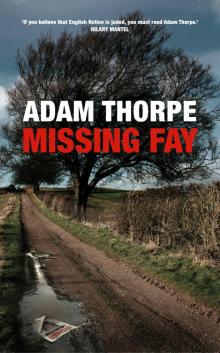 Missing Fay
Missing Fay Hodd
Hodd Pieces of Light
Pieces of Light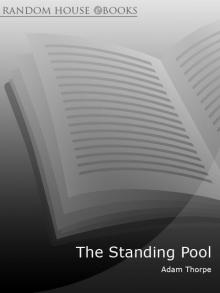 The Standing Pool
The Standing Pool Ulverton
Ulverton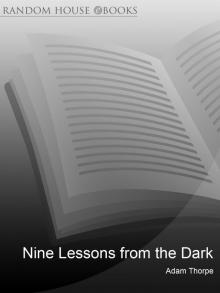 Nine Lessons From the Dark
Nine Lessons From the Dark Flight
Flight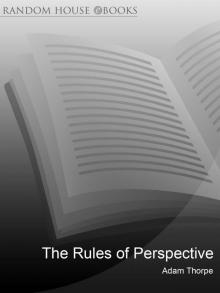 The Rules of Perspective
The Rules of Perspective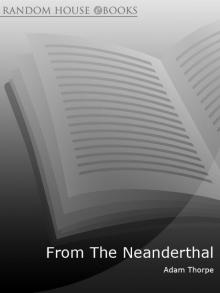 From the Neanderthal
From the Neanderthal Is This the Way You Said?
Is This the Way You Said?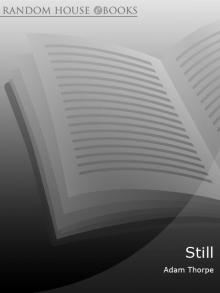 Still
Still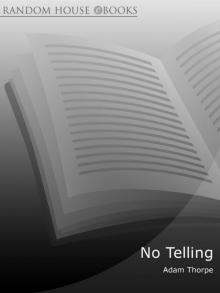 No Telling
No Telling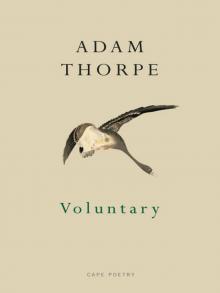 Voluntary
Voluntary Between Each Breath
Between Each Breath